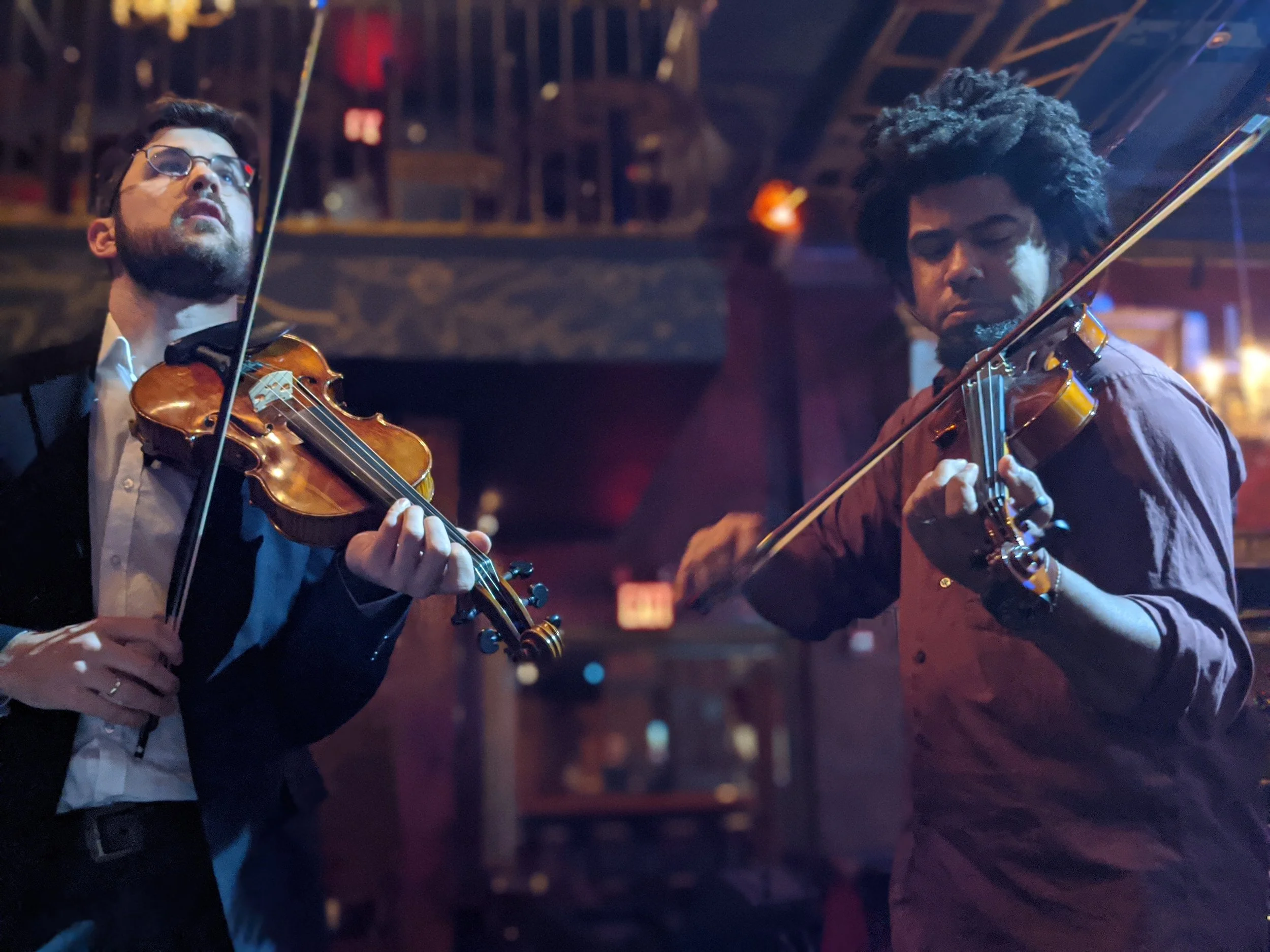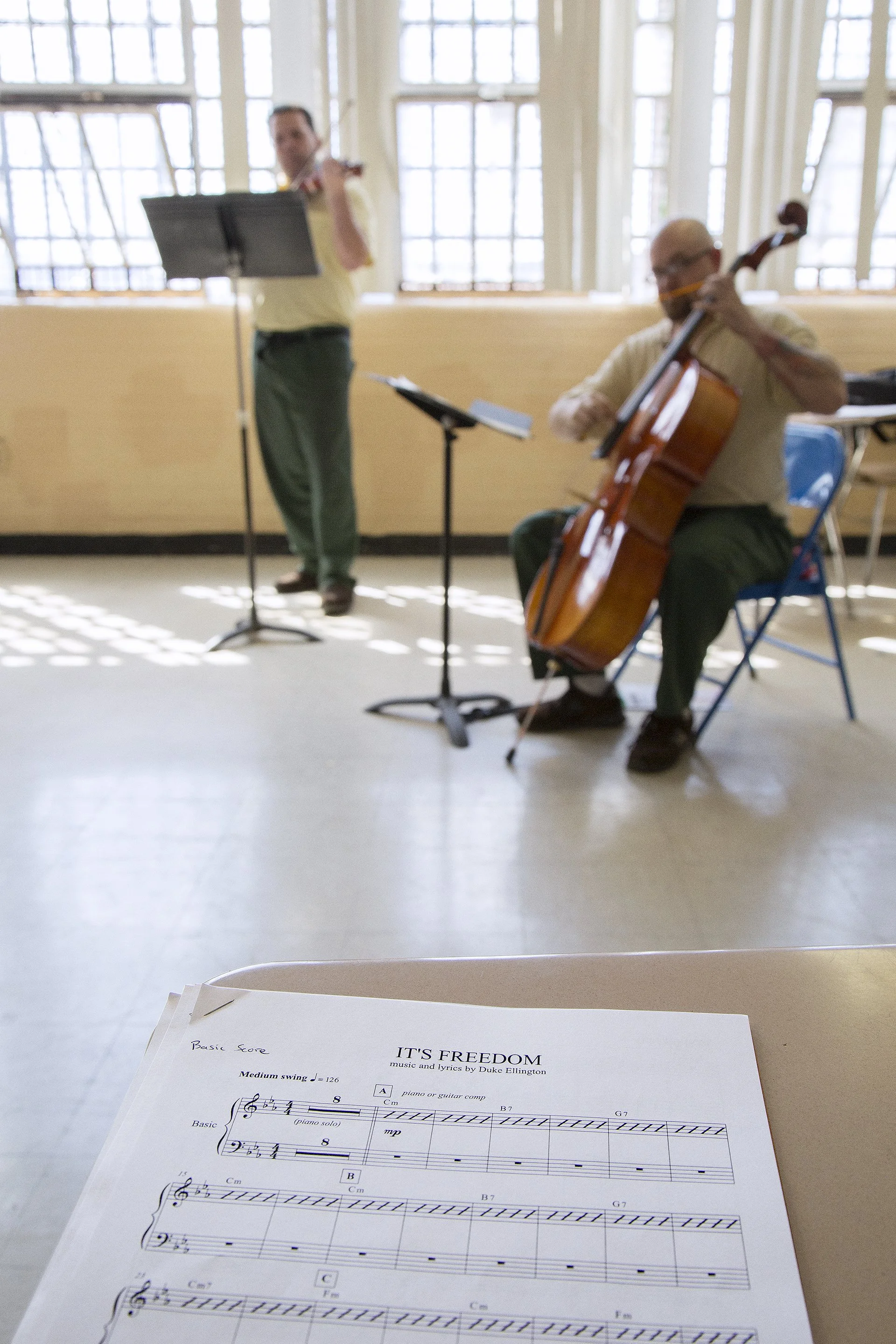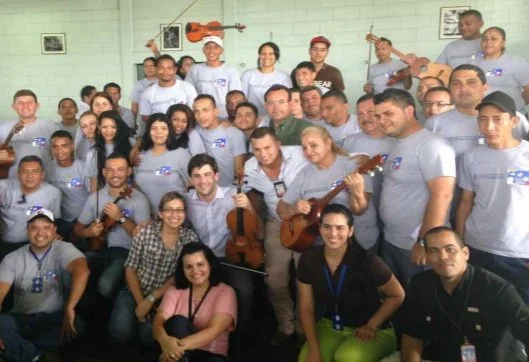A Decade of Musical Change:
The Musicambia Story
Founder & Artistic Director Nathan Schram with Alumnus Robert Pollock
Musicambia is inspired by El Sistema. El Sistema promotes music ensembles as a perfect model of a functional society. “The System” teaches the values of working independently and cooperatively through intensive music study and performances.
"The relationships & the community teach us how to be part of the world again."
— Musicambia participant at Sing Sing
Seeds of Inspiration
Musicambia's journey began with a transformative experience in the most unlikely of settings. In 2013, violist and composer Nathan Schram became the first American invited to observe Venezuela's revolutionary El Sistema prison music programs. Moving through five correctional facilities, Schram witnessed students immersed in over 30 hours of weekly music instruction—a commitment that was profoundly reshaping not just individual lives but entire institutional cultures.
What struck Schram most wasn't just the technical proficiency these musicians developed, but the fundamental human transformation occurring through music. He observed how creative expression fostered dignity, discipline, and community in environments where these qualities were often in short supply. The experience crystalized a powerful vision: music as a catalyst for personal and social change within correctional settings.
From Vision to Reality
Returning to the United States with this vision, Schram initially launched Musicambia as a branch of Carnegie Hall's Musical Connections Program at Sing Sing Correctional Facility. By 2014, the initiative's unique approach and growing ambitions justified its incorporation as an independent nonprofit organization dedicated exclusively to bringing music education to incarcerated populations.
What began at Sing Sing quickly became Musicambia's Flagship Program—a comprehensive musical education experience held every other weekend from September through June. Under the guidance of 16 diverse Teaching Artists, 30 incarcerated men learn instrumental and vocal performance, music theory, songwriting and composition, and ensemble performance. Regular concerts showcase original student compositions before audiences of up to 150 fellow residents, creating powerful moments of connection and recognition.
Growth Through Leadership
As Musicambia's impact deepened, so did its organizational capacity. In 2017, Jessie Kilguss joined the team as a grant writer, quickly demonstrating leadership that led to her becoming the organization's first full-time employee in 2018, supported by the New York State Regional Economic Development Council. Her promotion to Executive Director in 2019 marked a period of significant growth before she transitioned to the Board of Directors in late 2022. The leadership baton passed to current Executive Director Shawn Jaeger in September 2023, continuing Musicambia's tradition of arts-centered leadership.
Expanding the Movement
What began as a single program has evolved into a growing network of musical transformation across the country. Beyond the Flagship Program at Sing Sing, Musicambia now operates several additional programs with strategic partnerships that amplify its impact:
Bedford Hills Correctional Facility (New York) in collaboration with Rehabilitation Through the Arts
Lansing Correctional Facility (Kansas) alongside the University of Missouri-Kansas City
San Quentin Rehabilitation Center (California) in partnership with William James Association and San Francisco Conservatory of Music
The organization's influence has extended even further through previous programs at Allendale Correctional Institution in South Carolina, Rikers Island in New York City, and Pitchess Detention Center in California.
Beyond Music: Building Life Skills
Musicambia's work transcends musical instruction. Through carefully designed programming, participants develop essential life skills including effective communication, teamwork, creative problem-solving, and self-confidence. These transferable capabilities, cultivated through collaborative music making, create pathways for successful reintegration and personal transformation.
As Musicambia enters its second decade, the organization continues to expand its reach while deepening its impact—transforming lives through the universal language of music and creating models for arts-based rehabilitation that resonate far beyond correctional walls.
Sing Sing participants Jason and Joe rehearse
A Day at Musicambia
Walk through the education building at Sing Sing Correctional Facility on a Musicambia program day, and what strikes you isn't what you hear—it's what you forget.
In one corner, two violinists lean toward each other, brows furrowed in concentration as they navigate the intricate rhythms of a Bach invention arranged specifically for their ensemble by a Musicambia Teaching Artist. Their counting is punctuated by moments of triumph when difficult passages finally click into place.
Nearby, a Teaching Artist guides an experienced violinist and novice violist through left-hand technical exercises.
Cross the hallway, and the atmosphere transforms as jazz chords build and blend until suddenly—the unmistakable groove of Herbie Hancock's "Chameleon" emerges from a circle of musicians. What begins as harmony practice evolves into joyful improvisation as participants take turns weaving original melodies over Hancock's iconic bass line, each solo met with nods of appreciation from fellow musicians.
In quieter rooms nearby, participants immerse themselves in individual pursuits—some sharing newly composed pieces with Teaching Artists, others mastering techniques on instruments that Musicambia provides, free of charge. Participants move freely between these creative hubs, following their musical curiosity.
For these precious hours each session, you might entirely forget you're standing inside a maximum security prison. What surrounds you instead resembles nothing so much as a vibrant music conservatory—a temporary but powerful transformation of both space and possibility.
This transformation matters profoundly when you consider the context: according to the NAACP, America's prison population has quadrupled since 1980, with one in every 100 adults now incarcerated. The vast majority will eventually return to our communities, yet few programs equip them with the communication skills, creative thinking, and collaborative abilities essential for successful reintegration.
In a system where rehabilitation often remains an afterthought, these musical moments build precisely the skills and confidence needed for that crucial transition home—creating harmony that extends far beyond these walls.
Nathan’s Venezuela Letter
Read Nathan’s personal blog about his experience as the first American to visit the El Sistema penitentiary system program in Venezuela.
Nathan at a correctional facility in Venezuela in 2013.



